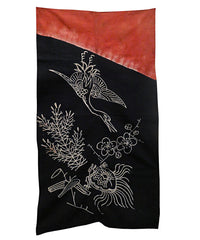A Yuage from Izumo: Baby Towel with Medicinal and Auspicious Properties
late nineteenth, early twentieth century
43 1/12" x 24", 110.5 cm x 61 cm
This beautifully dyed cloth is laden with symbols and meaning: it is a yuage, a hand woven cloth from the Izumo area of Japan which has a long history of rich and beautiful indigo dyeing traditions.
A yuage is a towel used for babies and more than likely this was presented to a new couple upon their marriage as part of the bride's trousseau.
Yuage are typical of Izumo and are easily distinguished by the distinctive red corner, often placed on the upper left but in this case it spans the width of the top of the cloth.
The red is dyed either in benibana or safflower or in akane or madder. The reason for this area of red dye is for drying the baby's face: it was believed that cleaning the baby's face with cloth saturated in safflower or madder dye would prevent small pox.
The images of plum, pine, tortoise and bamboo are typical hand resisted decorations to a yuage as they are symbols of protection to the baby: the plum meaning courage, the pine meaning long life.
Likewise the crane and tortoise are wishes for a long life. Where the crane is concerned it is said that the closed beak of the crane is a sly wish for a son whereas if the beak is open it suggested a female baby. Tsutsugaki textiles of Izumo are widely discussed in the book Country Textile of Japan by Reiko Mochinaga Brandon where examples of yuage are illustrated.
The cloth is in good, used condition with just a small bit of discoloration to the pine needles on the left of the cloth and this is shown on the detail photo which accompanies this post. The red dye (perhaps madder) is also a bit faded.
Yuage are a highly desirable collectible textile from one of Japan's leading indigo dyeing centers and this one is a nice example with good age.
Recommended.


